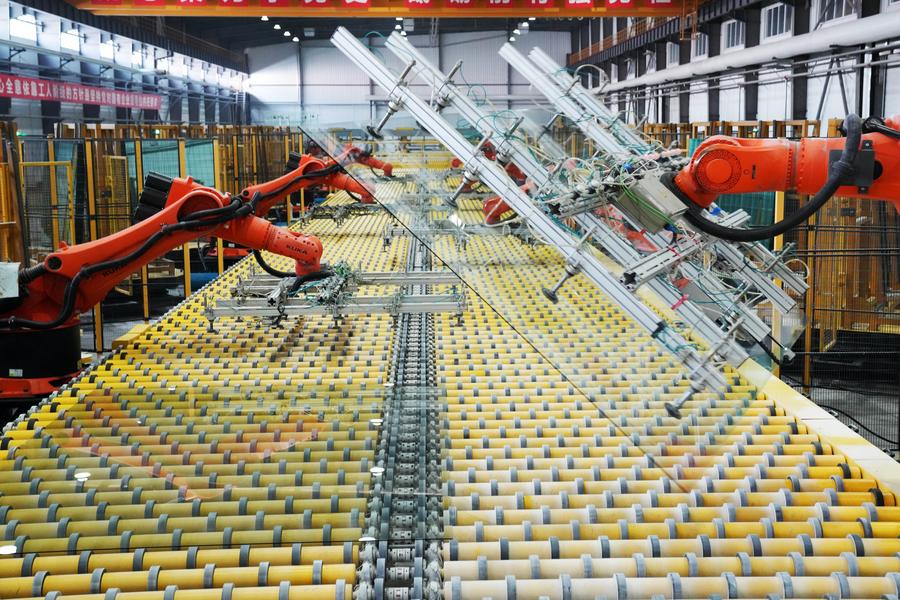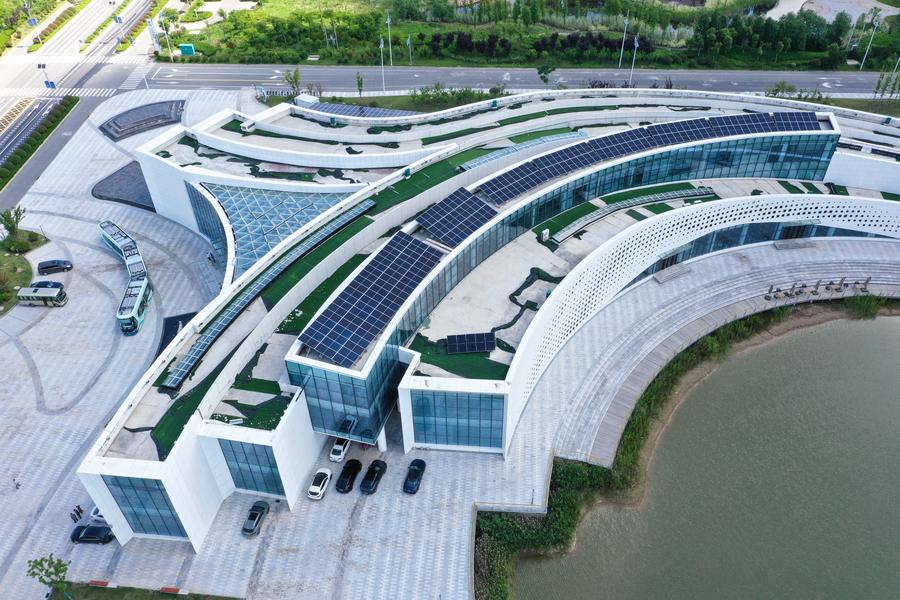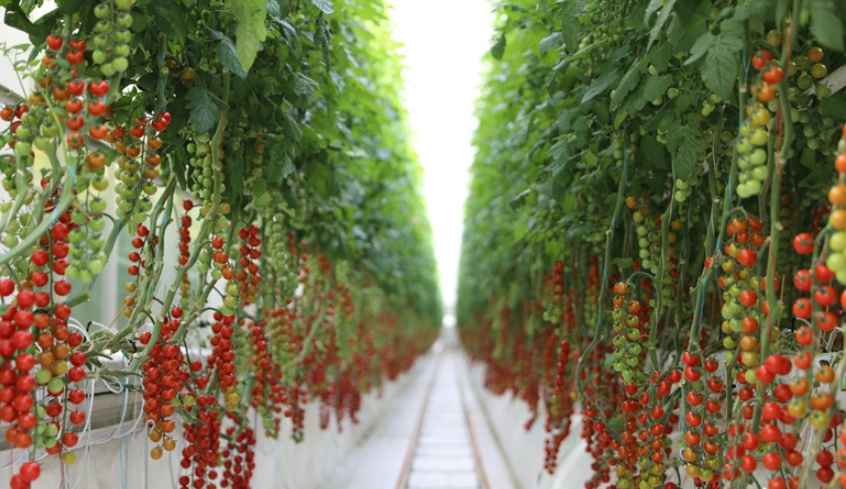Sci-tech innovation injects new energy into high-quality development

This photo taken on Feb. 17, 2023 shows robot arms working on the production line at a glass factory in Jiamusi, northeast China's Heilongjiang Province. (Xinhua/Wang Jianwei)
BEIJING, June 23 (Xinhua) -- In a sheet-steel plant of China Baowu Steel Group Corporation in Xinyu, east China's Jiangxi Province, robots and three unmanned intelligent vehicles are busy working in the dark, delivering rolls of steel from the warehouse.
Both the unmanned intelligent vehicles and robots work 24 hours a day, lifting 7,000 tonnes of steel rolls daily, according to Hu Hua, a worker at the plant. The tonnage has been increased by 120 percent per hour, while the loss rate has dropped by more than 90 percent, saving more than 180,000 yuan (roughly 25,000 U.S. dollars) each year.
Meanwhile, the traditional iron-making workshop at the plant has also achieved an intelligent transformation, with computers effortlessly managing crucial tasks like adjusting furnace temperatures and airflow for molten-iron smelting.
Jin Hongbing, a veteran at the workshop, said the smart transition of the whole operation process has effectively improved the production efficiency. "About 2.6 million yuan can be saved annually by reducing the failure rate," said Jin.
Such changes have been brought about by a centralized control center. The status and index data of production lines, including energy consumption and the carbon emissions, are displayed in real time on a big screen. It helps shorten the steel-roll production process from one hour to 10 minutes.
"Digitization and intelligent technologies have helped realize accurate management and efficient coordination of production, purchasing, logistics and sales," said Liu Jianrong, chief representative of Jiangxi Headquarters of Baowu.
Baowu's story provides an illustration of the broader intelligent transformation and high-quality upgrading of China's traditional manufacturing and production industries.
China is striving to foster and strengthen new quality productive forces through the deep integration of sci-tech innovation and industrial upgrading, so as to accelerate the creation of new dynamics for high-quality development.
As the technology intensity continues to improve, the added value of the country's equipment manufacturing industry has steadily increased.
In recent years, the average annual growth rate of the added value of high-tech manufacturing and equipment manufacturing has reached about 10 percent, significantly higher than the average level of all industries above the designated size.
GREEN DEVELOPMENT
Not only are traditional industries such as steel and non-ferrous metals extensively applying digital and intelligent technologies, but emerging industries like big-data storage and processing, information and communication, bio-manufacturing and new energy vehicles are also establishing new examples of modernized production and industrial intelligence in this era.
An energy big-data project is under construction in Guiyang, southwest China's Guizhou Province. The project's first 500 10kW cabinets are expected to be put into operation by the end of this year.
"We aim to build a green, energy-saving, shared, open and internationally leading energy data center," said Wang Junhao, project manager from a power-grid big-data services company based in Guangzhou, capital of south China's Guangdong Province.
Green development is taking shape on a large scale in almost all economic and social sectors, including infrastructure, energy, transportation, construction, architecture, tourism and waste management.
By the end of 2023, China's cumulative installed capacity of wind power and photovoltaic energy reached 1.05 billion kilowatts, accounting for 40 percent of the world's total installed capacity of new energy, while almost 9.5 million new energy vehicles were sold, topping the world for nine consecutive years.
Besides, China has set up 3,657 green factories, 270 green industrial parks, 408 green supply-chain enterprises, promoting nearly 30,000 green products.
"China has gradually built a full-chain green manufacturing and product supply system," said Zhang Yongsheng, a researcher of the Research Institute for Eco-civilization of Chinese Academy of Social Sciences.

This aerial drone photo taken on June 6, 2024 shows a solar photovoltaic system on the rooftop of a building at a low (zero) carbon-dioxide emission industrial research institute in Sheyang, Yancheng, east China's Jiangsu Province. (Xinhua/Yang Lei)
SMART FUTURE
At the ongoing 2024 World Intelligence Expo, held in Tianjin Municipality, north China, a robot barista has attracted the attention of visitors.
It can promptly heed the call for coffee, waving its arms to perform each step: taking beans, grinding, steeping and brewing. In no time, another fragrant cup of coffee is presented to a delighted attendee.
It utilizes 3,000 hours of Artificial Intelligence (AI) learning and 30,000 hours of robotic arm training to replicate the techniques of an experienced barista.
"AI is accelerating its deep integration with various industries, giving birth to new fields and tracks that will lead future development, achieving a revolutionary upgrade in productivity and production efficiency," said Long Teng, vice minister of science and technology.
With the support of AI tools, more sci-fi scenarios, such as self-driving vehicles shuttling back and forth, robot arms picking vegetables and automatic micro-nano 3D printing applied on chips, are becoming a reality in China.
AI serves as one of the major catalysts for future industries, which are considered to contain infinite possibilities of sci-tech innovation and represent the high-quality development trend of the future.
In recent years, local governments in Beijing, Shanghai, Jiangsu and Zhejiang have all issued policies and documents to cultivate future industries. The development of innovative products such as humanoid robots, quantum computers, brain-computer interfaces, 6G network equipment, ultra-large new intelligent computing centers and advanced aviation equipment have been actively planned in many places across the country.
The forming of new quality productive forces cannot be separated from the growth of strategic emerging industries and future industries.
By 2025, some fields of China's future industries are expected to reach the international advanced level, said Bai Jie, an official with the Ministry of Industry and Information Technology, noting that by 2027, the comprehensive strength of the country's future industries will be significantly improved and the key core technologies will make remarkable breakthroughs.
Photos
Related Stories
- Financial regulators eye high-quality development with major policy measures
- Chinese vice premier stresses high-quality development in manufacturing
- China's Gansu strives to improve people's incomes amid high-quality development
- China's southern gateway region eyes high-quality development, further opening up
- Diplomatic envoys highlight big data development, int'l cooperation in China's Guizhou
- Chinese premier chairs State Council executive meeting
Copyright © 2024 People's Daily Online. All Rights Reserved.









